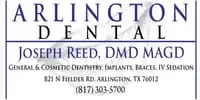Arlington Dental offers a variety of methods to finance your dental work if it is not otherwise covered by insurance. We accept MasterCard, VISA, Discover and American Express credit cards. We also participate in the CareCredit healthcare payment method which is available with approved credit:
- Interest Free Payment Plans
- No Down Payment
- No Annual Fees
- Covers Up to 100% of Treatment
- You Can Begin Treatment Immediately

What Your Dental Insurance Company Doesn’t Tell You
Exposing the Myths of Dental Insurance
Will my insurance pay all my dental bills?
Not always. In fact, for most patients it won’t.
Why not? Isn’t that what insurance is for?
No. The fact is that most insurance – life, fire, theft, liability- merely helps the purchaser meet the expense of some misfortune. Life insurance won’t support the surviving beneficiary for the rest of his or her life. Fire insurance on your home won’t pay for replacing everything that is destroyed. It’s the same with dental insurance, which is designed to help you meet dental bills – not pay 100 percent of them.
Why don’t insurers tell you you’re not fully covered?
Nobody sells insurance by calling attention to what it doesn’t do. The insurers – commercial companies, Blue Cross, and Blue / Shield, and even government agencies – see no reason to remind the purchaser of what their policies do not cover.
Why do insurers say doctors are overcharging?
Because they don’t want to admit that they are underpaying. Their accusation of overcharging is often made when a policy promises reimbursement for bills based on the doctors “usual, customary, and reasonable” charges. Originally, the term used was “usual and customary”, and it meant the customary charge a dentist made to a patient receiving a particular treatment. Over the years, the insurers gradually changed the meaning of the term. First they ruled that “usual and customary” didn’t mean what it said, but meant the average of all the fees charged for a particular treatment by all dentists in a particular region. They said they would not pay even this averaged amount, but just a percentage of it. Stop and think about this: It means the insurers, on their own; decided they would pay only part of your dentist’s bill. It does not mean, as they often say, that your dentist has overcharged you; it means that the insurers are underpaying you, assuming that you won’t realize it, and that you can’t do anything about it. Also, some insurers lag as much as 18 months behind in calculating the averaged fees. This causes you a further loss, because your insurance reimbursement is now a percentage of average fees a year and a half old – which may not reflect your dentist’s present charges. The insurers also changed their policies to say “usual, customary, and reasonable” charges. A dentist’s fee can be “usual and customary”, but the insurers call it unreasonable and refuse to pay it. Since nobody can guess what the insurers will decide is unreasonable, a policyholder often doesn’t learn until a notice arrives claiming falsely that the dentists’ bill is an overcharge.
